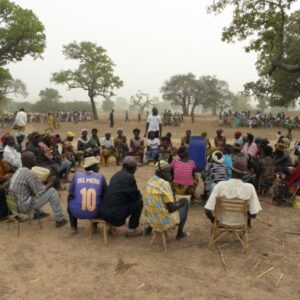HOUSTON, TX (ANS – September 1, 2015) – Why are we doing what we are doing? What are we here for? How did this get started? What is the origin and history of some particular practice or custom? These are all great questions that can prompt important conversations and promote positive reflection. These kinds of questions and conversations can sometimes lead to saving lives and changing destinies.
In conversation with a friend who leads a major organization, I asked a few questions that my he responded to by saying, “I have never thought about that; no one has ever asked me those questions before.” It’s easy to do things simply because we observed certain behavior in other people. We may have the attitude that, ”This is how we have always done it.” Change is often hard, and we all have comfort zones that we may prefer to stay in.
Years ago another friend asked me, “Jerry, have you ever thought about writing a book?” Well, I had thought about it, but had not acted on it. That friend’s question actually put things in motion that resulted in my first book being published in 1992. It is refreshing to be around people who ask good questions. The right questions can have a transformational impact on our lives and the lives of those around us.
In relation to impacting the lives of people around us for the advancement of the Kingdom of God, questions are an effective tool. In fact, asking the right questions can often result in immediate life change. Asking a simple question can often open a conversation to share some life-changing truth. Of course, asking questions and telling true stories from the Word of God is a simple, but strategic way of communicating the Good News of Jesus and making disciples.  The seed of the Word of God, taking root in fertile hearts, can produce much fruit.
The seed of the Word of God, taking root in fertile hearts, can produce much fruit.
It is liberating to realize that God can use any and all of His children as change agents. We really don’t have to have a great deal of knowledge, an important position or special skills. God has put it within each of us, as His followers, to be instruments of change. Jesus once asked a blind beggar, “What do you want me to do for you?” This encounter, recorded in Mark 10, is one of the stories we in Living Water International often use in our Orality Training Workshops. A lady in a recent workshop, after learning, retelling, discussing and reflecting on the story, considered the question, “What would I say, or how would I respond, if Jesus asked me, ‘What do you want me to do for you?’”
Over the years we’ve discovered that engaging in small groups, discussing these kinds of questions, can give new perspective and insight. We often see new passion and excitement arise about sharing our lives in Christ, living in community and advancing the Kingdom of God. Those experiences are great, not only for learning, but for bonding and improving relationships. We can learn how to better respond to people and circumstances. Of course, we know from Scripture that we are to respond to people with loving kindness and to circumstances with rejoicing and thanksgiving.
Asking the right questions in the right context can have a powerful impact. For example, in relation to the work of the Church and missions, many people have different understandings, based on culture, traditions and other factors. Our experience in Orality Training is that deep and profound insights can come in the process of asking and discussing the right questions. Taking a more in-depth look at some important matters in ministry and mission work can come from considering the following questions:
- What is a church?
- What do churches exist for?
- What is a disciple? How does one become a disciple? What do disciples do?
- What is the Great Commission, and who should be involved?
- How did Jesus make disciples? Can we do it the way He did?
- What is, or should be, our highest priority as followers of Jesus?
- Why do we in the modern world often make things more complicated than they need to be?
These are all important questions that can bring significant change when we seriously consider them, not based on 2,000 years of church tradition, but based on what we can or should learn from Jesus and Scripture. Why has the work of God become so complicated and complex, when Jesus made it clear and understandable? We in the Modern Western World are in a season when we should be rethinking, and sometimes unlearning and relearning, certain things we have often taken for granted.
 I remember a conversation I had years ago with a young lady about the gospel and what it means to be born again and believe in and follow Jesus. In astonishment, she said, “You mean, you mean I don’t have to go through religion?” It just seems that it is human nature to make things more complicated and complex than God intended. Following Jesus and being a reproducing disciple maker is not something one needs a Bible college or theological education to participate in. As valuable as a formal education can be, it’s really encouraging to see how simple people with little or no formal education can grasp the love and message of Jesus and pass it on to others.
I remember a conversation I had years ago with a young lady about the gospel and what it means to be born again and believe in and follow Jesus. In astonishment, she said, “You mean, you mean I don’t have to go through religion?” It just seems that it is human nature to make things more complicated and complex than God intended. Following Jesus and being a reproducing disciple maker is not something one needs a Bible college or theological education to participate in. As valuable as a formal education can be, it’s really encouraging to see how simple people with little or no formal education can grasp the love and message of Jesus and pass it on to others.
Our experience in the Orality movement is that the methods and principles are effective in any place and with all people groups around the world. Foundational is an understanding and appreciation of the importance of prayer and the work of the Holy Spirit. He is creative and unlimited in the ways He can draw people to Himself and thrust them into the harvest. A prominent pastor and leader of a network of churches who participated in an Orality Training for Trainers wrote, “Thank you for this training, it has been a real eye opener and given us fresh vision for how the gospel can spread throughout our nation.”
Years ago I heard Dr. Dick Eastman, International President of Every Home for Christ, say, “When God’s work becomes too complicated and expensive, we may need to reevaluate whether the Lord is in it or not.” A former pastor of mine used to say that our main focus ought to be on loving people and telling them the truth. There seems to be a lost art of simplicity in our modern world, and a need to regain an understanding of the power of simplicity.
As I travel and minister in many parts of the world, it seems there is a greater awareness of the need to simplify, streamline and focus our time and resources on the most high impact activities. Of course, that means different things to different people, depending on context, culture, worldview and other issues. However, with the Word of God and the direction of the Holy Spirit, we can have confidence that we can know and pursue His will. As we move out in faith, His Spirit will make course corrections, but we must move first, we must act in faith on His revealed Word.
Ultimately, the most important questions are those we should be asking God – “What do You want me to do?” Or, “How do You want me to respond in this situation?” I believe the Lord delights in answering questions such as these. One of the reasons that King David was known as a man after God’s own heart is because he was constantly inquiring of the Lord. It would be valuable for each of us to form the habit of regularly inquiring of the Lord before making decisions or taking action.
For more information about Living Water International or Orality Training resources and opportunities, visit www.water.cc/orality .
Photo captions: 1) The Power of Small Group, Interactive Learning 2) This is a true Story from the Word of God. 3) All ages enjoy Stories and Questions. 4) Jerry Wiles.











